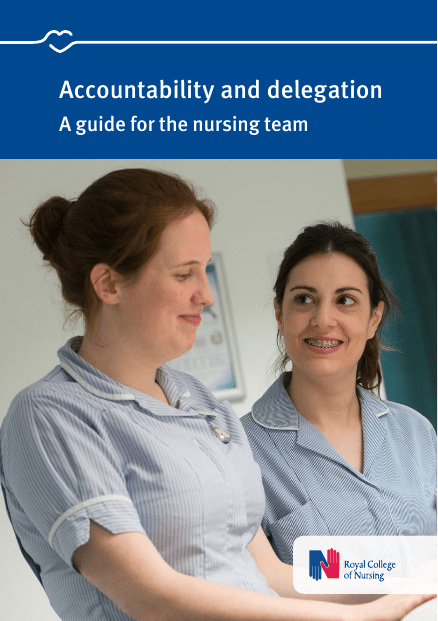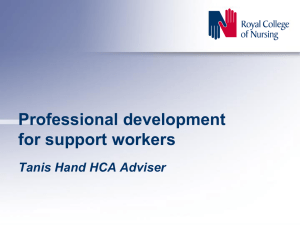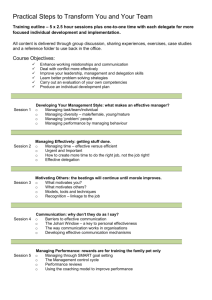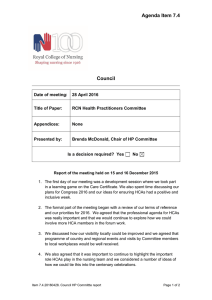Accountability and delegation A guide for the nursing team
advertisement

Accountability and delegation A guide for the nursing team The nursing team is made up of many different people bringing with them a range of skills, knowledge and competence. The person in overall charge of the nursing care of the patient is usually the registered nurse. But the nurse cannot perform every intervention or activity for every patient or client and therefore they will need to delegate aspects of care to colleagues. The principles of accountability and delegation, explained in this leaflet, can be applied to any relevant member of the nursing team including health care assistants, assistant practitioners, registered nurses and nursing students. Accountability: You and the law Health service providers are accountable to both the criminal and civil courts to ensure that their activities conform to legal requirements. In addition, employees are accountable to their employer to follow their contract of duty. Registered practitioners are also accountable to regulatory bodies in terms of standards of practice and patient care (RCN et al., 2006). The law imposes a duty of care on practitioners, whether they are health care assistants (HCAs), assistant practitioners (APs), students, registered nurses, doctors or others, when it is “reasonably foreseeable” that they might cause harm to patients through their actions or their failure to act (Cox, 2010). The duty of care applies whether they are performing straightforward activities such as bathing patients or undertaking complex surgery. In each instance there is an opportunity for harm to occur. Once a duty of care applies, the key question to ask is: what standard of care is expected of practitioners performing particular roles? All practitioners must ensure that they perform competently. They must also inform a senior member of staff when they are unable to perform competently. 3 In order for anyone to be accountable they must: • have the ability (knowledge and skills) to perform the activity or intervention • accept the responsibility for doing the activity • have the authority to perform the activity within their role, through delegation and the policies and protocols of the organisation. Case study: following the process Jo, an HCA, is working in the respiratory clinic at a GP surgery. She performs spirometry on a patient, having been previously assessed as competent to carry this out following training and education in spirometry (ability). The role forms part of her job description (responsibility). The respiratory nurse has delegated this activity (authority) to her in full knowledge of her level of competence and job description. The nurse retains the professional responsibility of appropriate delegation and Jo, though not currently regulated, is accountable for her actions. 4 Delegation Registered nurses have a duty of care and a legal liability with regard to the patient. If they have delegated an activity they must ensure that it has been appropriately delegated. The Nursing and Midwifery Council’s (NMC) code (2015) states in the section entitled ‘Practise effectively’ that registrants must: Be accountable for your decisions to delegate tasks and duties to other people To achieve this, you must: • only delegate tasks and duties that are within the other person’s scope of competence, making sure that they fully understand your instructions • make sure that everyone you delegate tasks to is adequately supervised and supported so they can provide safe and compassionate care, and • confirm that the outcome of any task you have delegated to someone else meets the required standard. 5 Delegation of duties is summarised in this statement from NHS Wales (NLIAH, 2010) “Delegation is the process by which you (the delegator) allocate clinical or non-clinical treatment or care to a competent person (the delegatee). You will remain responsible for the overall management of the service user, and accountable for your decision to delegate. You will not be accountable for the decisions and actions of the delegatee”. Employers have responsibilities too, and as HCAs and APs develop and extend their roles the employer must ensure that its staff are trained and supervised properly until they can demonstrate competence in their new roles (Cox, 2010). Employers accept ‘vicarious liability’ for their employees. This means that provided that the employee is working within their sphere of competence and in connection with their employment, the employer is also accountable for their actions. 6 Principles of delegation: • Delegation must always be in the best interest of the patient and not performed simply in an effort to save time or money. • T he support worker must have been suitably trained to perform the intervention. • Full records of training given, including dates should be kept. • Evidence of competence assessment should be recorded, preferably against recognised standards such as National Occupational Standards (www.skillsforhealth.org.uk). • T here should be clear guidelines and protocols in place so that the support worker is not required to make a ‘stand alone’ clinical judgement. • T he role should be within the support worker’s job description. • T he team and any support staff need to be informed that the activity has been delegated (for example, a receptionist in a GP surgery or ward clerk in a hospital setting). 7 • T he person who delegates the activity must ensure that an appropriate level of supervision is available and that the support worker has the opportunity for mentorship. The level of supervision and feedback provided must be appropriate to the activity being delegated. This will be based on the recorded knowledge and competence of the support worker, the needs of the patient/client, the service setting and the activities assigned (RCN, 2012). • Ongoing development to ensure that competency is maintained is essential. • T he whole process must be assessed for the degree of risk. 8 Case study: knowing the boundaries An HCA in a nursing home is helping a patient with diabetes to remove their socks before bed and notices that there is a wound on the patient’s large toe which looks inflamed. Although the HCA is experienced and competent at standard dressings she is aware of the risks associated with wounds on the feet of patients with diabetes and therefore knows that to treat this would be outside of her sphere of competence. She is also aware that the wound has not yet been assessed by a registered nurse. The HCA reports the wound to the registered nurse who takes over the care of that wound. The HCA has acted according to the protocols of the workplace and can justify her actions. She has demonstrated that she understands her accountability and responsibilities towards that patient. 9 Points to check when delegating Best interest of patient Education and training Competent and written evidence of assessment Protocols Job description 10 Is it still in the best interest of the patient to delegate? Risk management Ongoing professional development Supervision and mentorship Everyone knows task has been delegated 11 Case study: risk management As instructed by the nurse in charge, Gita, an HCA, is working in a bay on a medical ward, observing a patient with a diagnosis of depression and unstable diabetes. The patient expresses to Gita that he has suicidal thoughts. Gita is aware that the patient has previously self-harmed. She uses the patient call bell to bring the nurse in charge to the patient’s bedside. She reports her conversation with the patient to the nurse in charge so that the nurse can assess the patient and decide on the appropriate action and plan of care. Gita is aware that dealing with this risk to a vulnerable patient is outside her level of competence and that timely referral to the registered nurse is appropriate. 12 Delegation checklist Are you delegating an activity to an HCA? Ask yourself the following questions: Delegation must take into account the context of every situation rather than focusing on activities alone. • Is delegation in the best interests of the patient? • Have you considered the clinical risk involved in delegating? • Do you have authority to delegate the work and the appropriate clinical knowledge? • Does the HCA have the skills and knowledge required to undertake the activity, including communication and interpersonal skills, as well as clinical competence? • Does the HCA have the capacity to take on additional work? • C an you provide support and supervision and check that the outcome of the delegation meets the required standard? 13 Have you answered yes to all of these questions? • If so, then delegation is appropriate. • If not, you must not delegate the activity as it would not be appropriate or in the best interests of the patient. If there is a need for additional training and development, consider when and how this need may be addressed. Once you have determined that delegation is appropriate, follow these steps: 1. Prepare • Refer to or develop robust protocols and procedures based on current best practice. • Check the HCA job description is up to date. 2. Communicate • Clearly explain the activity to be delegated to the member of staff and ensure it is fully understood. • Make sure all other members of the team involved understand what is to be delegated, who to, the process involved, and their own accountability and responsibility. 14 • Check with the colleague that they understand the required outcome of the delegated activity and should not attempt to perform any further duties beyond what has been instructed. • Ensure the person to whom you delegate is aware of their responsibility to raise issues of concern, report back and seek support when appropriate. 3. Training and assessment • P rovide appropriate training,education and assessment for the person to undertake the delegated activity. • F ollowing the training, ensure a competence assessment has taken place and is documented, building in a regular review of competence (RCN 2012). • Keep records and review training and development needs regularly. • P rovide regular supervision and monitoring. 4. Evaluate • W hat were the benefits of delegating the activity? • Did it go to plan, and if not, why not? • W hat can be done to ensure any difficulties are avoided next time? 15 Are you being asked to accept the delegated activity? Follow this checklist to determine whether or not it’s appropriate for you to accept it. • Has the degree of risk been considered? – A re you sure that the activity is not too complex for you to accept? Would you be compromising patient care by accepting it? • Does the person delegating have the authority to delegate the work? – A re you confident that they hold the appropriate clinical knowledge to delegate the activity to you? • Do you have the skills and knowledge required to undertake the task? – A re you confident about the communication and interpersonal skills required as well as your clinical competence? • A re you sure that accepting the work will not impact on your performance? – Do you have the capacity to take on additional work? Have you answered yes to all of these questions? Then accept the delegated activity. If not, say no: accepting it would not be appropriate and in the best interests of the patient. 16 After accepting the delegated work: • keep your skills and knowledge up to date. Request regular updates with your supervisor if you are not offered them • work within guidelines: There must be clear and robust protocols in place and these must be reviewed regularly • regularly check that your job description is accurate and up to date, reflecting the new roles and responsibilities • do you know what to do if you have any concerns? There must be adequate supervision and access to support when required. You have a duty to let your colleagues know and not to undertake any activities that you do not feel is appropriate at that time. Delegation must be safe and aim to improve the care of all patients within any given setting. 17 If you are unsure about any aspect of delegation, always seek further advice or clarification. For more information and advice on the issues within this booklet, visit www.rcn.org.uk/hca or RCN members can call RCN Direct on 0345 772 6100 References Cox C (2010) Legal responsibility and accountability; Nursing management 17: 3: 18-20 June 2010 NLIAH (National Leadership and Innovations Agency for Healthcare) (2010) All Wales guidelines for delegation Nursing and Midwifery Council (2015) The Code: professional standards of practice and behaviour for nurses and midwives www.nmc-uk.org/Therevised-Code/ (Accessed 10 March 2015.) Royal College of Nursing et al (2006) Intercollegiate paper: Supervision, accountability and delegation of activities to support workers: a guide for registered practitioners and support workers. Royal College of Nursing (2008) Health care assistants and assistant practitioners. Delegation and accountability. 18 Royal College of Nursing (2012) Position statement on the education and training of HCAs. Skills for Health (2015) (www.skillsforhealth. org.uk/standards/item/215-nationaloccupational-standards ) (Accessed 2 March 2015) We are here to support HCAs and APs The RCN is the only union in the UK specialising in supporting those who work in nursing. We’re here when you need legal representation. We’re here to give you a stronger voice. We’re here to offer confidential advice. We’re here to help you realise your potential. Joining the RCN couldn’t be simpler We even offer an introductory rate for your first year – it’s just over £4 per month. 0345 772 6100 www.rcn.org.uk/join Pub code: 004 852 June 2015



